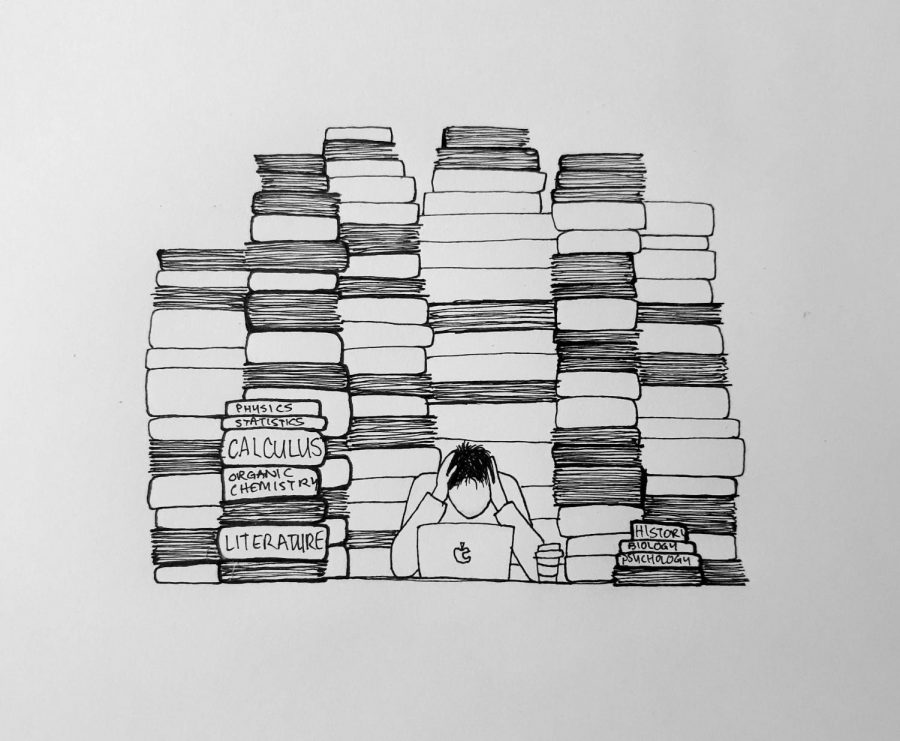Editorial | School-aged students deserve better mental health resources
January 26, 2021
The Clark County public school district in Nevada voted last week to begin phasing in an in-person return for students. The fifth largest school district in the country is choosing to bring students back not only because of the academic toll online learning has had on the students, but also because of the psychological toll. Between March — when the district first switched to online learning — and December, 18 district students committed suicide.
Depression and suicide in school aged kids is nothing new. The previous school year, the district saw nine student suicides — far fewer than the 18 in the course of six months, but still an alarming amount. But the COVID-19 pandemic has exacerbated suicide and depression rates by leaving students who are used to going to school seven hours a day — surrounded by peers — isolated in their homes, taking math class over Zoom. Many students relied on interactions with other human beings — teachers and friends, primarily — to lift their mood and buffer the stress of school. Obviously, for many students, the pandemic has taken all that away. It makes sense that mental health in school-aged kids is declining rapidly.
Most public schools lacked adequate mental health resources before the pandemic, and now can offer little help to suffering students. A recent study found that suicidal thoughts have worsened most drastically for young people during the course of the pandemic. If schools had been more equipped to help students manage their mental health before the pandemic, many school-aged students could likely be in a more secure mental space.
A majority of public schools in America received inadequate government funding before the pandemic, but amidst the pandemic, schools are seeing even less funding. In July, to deal with the worsening mental health crises in California’s schools, a panel — which included legislators, government health directors and executives — recommended schools start looking to work with non-profit organizations and businesses, and apply for grants outside of government funding. It’s good that school officials are looking for ways to care for their students amidst a public health crisis, but frankly, public schools shouldn’t be put in a position where they have to jump through hoops to provide resources for students.
While school-provided mental healthcare at the University level isn’t as adequate as some students wish, high school-aged students face much larger roadblocks. For instance, no matter their insurance status, all Pitt students have access to the Counseling Center — and therefore a therapist and psychiatrist — free of charge. While federal law requires public schools to employ psychologists, those psychologists only have to evaluate disabilities in students — not assist with their mental health needs.
The National Association of School Psychologists recommended in 2012 that schools employ one psychologist for every 500-700 students, which isn’t nearly enough to provide any kind of individualized care. This means that students essentially have to seek a clinician outside of the school — which can pose an issue for low-income students, students with inadequate insurance and students living in areas where there is a shortage of mental health professionals.
Obviously, the easiest way to fix this problem would be better government funding. That’s not going to happen overnight. But one thing any school could do, no matter its funding situation, is train teachers to lead with kindness. A major indication of depression and suicidal thoughts is loss of interest in everyday activities and declining school performance. Lack of performance often causes students to fail and fall behind, but teachers — many of whom already do — should work with students and reach out to them if their grades start to fall. A gesture of care, rather than punishment, could make a major difference. Especially right now.
Pandemic or no pandemic, mental health care in public schools is inadequate. Students shouldn’t have to rely on a singular school psychologist, or a teacher, to ensure their well-being. And the trajectory of their mental wellness shouldn’t be determined by the amount of money the government is willing to give a school. They deserve better.








